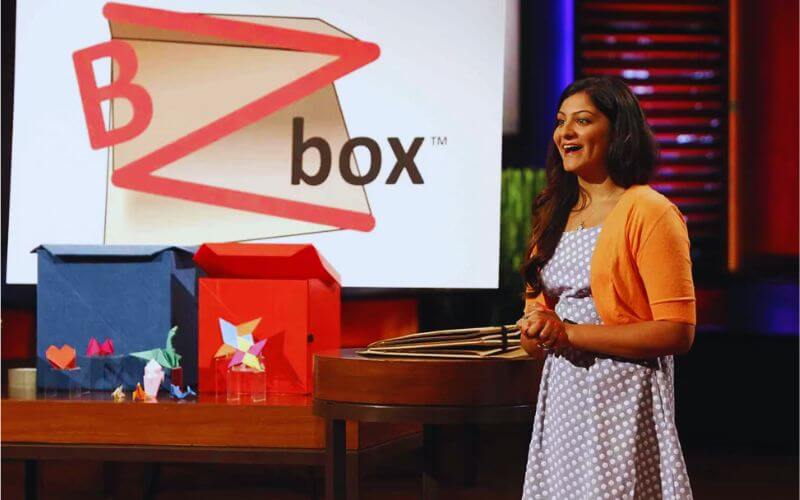In the world of entrepreneurship, the hit TV show Shark Tank has been a launching pad for countless innovative products and businesses. One such product that caught the attention of the Sharks and viewers alike was BZBox, a collapsible storage box created by then-20-year-old Kaeya Majmundar.
In this blog post, we’ll take a closer look at BZBox’s journey, from its promising beginnings on Shark Tank to its eventual demise, and explore the lessons learned along the way.
The BZBox Pitch and Deal at Shark Tank
Kaeya Majmundar appeared on Shark Tank Season 5, Episode 29, with her invention, BZBox – a collapsible storage box that could be easily assembled and disassembled without the need for tape or tools.
During her pitch, Kaeya impressed the Sharks with her confidence and the potential of her product. She initially asked for $50,000 in exchange for a 20% stake in her company. The Sharks were intrigued by the concept, but some had concerns about the product’s pricing and market viability.
Kevin O’Leary offered $50,000 for a 50% stake, while Lori Greiner proposed a deal of $50,000 for 40% equity, contingent upon BZBox being manufactured as a plastic storage box. Kaeya ultimately accepted Lori’s offer, and it seemed like BZBox was poised for success.
BZBox Is Gone Out of Business
Despite the promising start and the deal with Lori Greiner, BZBox eventually went out of business. The deal with Lori fell through during the 12-month due diligence phase, leaving Kaeya to navigate the challenges of bringing her product to market on her own.
One of the main issues faced by BZBox was the high production costs compared to traditional cardboard boxes. While a conventional box costs around $1 per unit, BZBox’s cost was approximately $1.75 per unit.
This price difference made it difficult for BZBox to compete in the market and attract customers who were used to the affordability of regular boxes.
What Was BZBox Net Worth?
At the time of Kaeya’s appearance on Shark Tank, BZBox was valued at $250,000 based on her initial ask of $50,000 for a 20% stake in the company. However, as the business struggled to gain traction and ultimately failed, the net worth of BZBox diminished significantly.
It’s important to note that the net worth of a startup can fluctuate greatly depending on various factors, such as market demand, competition, and the ability to scale production and sales. In the case of BZBox, the challenges faced in bringing the product to market and the inability to secure a sustainable customer base led to its eventual demise.
Who is Kaeya Majmundar?
Kaeya Majmundar, the founder of BZBox, was a young entrepreneur with a passion for innovation. Born and raised in the United States, Kaeya attended Emory University, where she studied economics and psychology.
It was during her time at Emory that she came up with the idea for BZBox, inspired by her own experiences moving and the frustrations associated with traditional cardboard boxes. After her appearance on Shark Tank and the ultimate failure of BZBox, Kaeya went on to found SwayPay, a platform specializing in viral marketing.
She has continued to pursue her entrepreneurial dreams and has become an advocate for young entrepreneurs, sharing her experiences and lessons learned from her journey with BZBox.
Business Overview
BZBox aimed to revolutionize the storage and moving industry with its collapsible, easy-to-assemble boxes. The product was designed to be more durable and user-friendly than traditional cardboard boxes, with the added benefit of being reusable and eco-friendly.
Despite the innovative concept, BZBox faced several challenges in its business model. The higher production costs compared to conventional boxes made it difficult to price the product competitively. Additionally, the target market for BZBox was relatively niche, consisting primarily of people who frequently moved or required storage solutions.
The failure of BZBox highlights the importance of thoroughly understanding the market, production costs, and potential challenges before launching a product. It also serves as a reminder that even with a great idea and exposure on a platform like Shark Tank, success is not guaranteed.
Conclusion
The story of BZBox and Kaeya Majmundar’s entrepreneurial journey is one of innovation, perseverance, and learning from failure. While BZBox ultimately did not succeed, Kaeya’s experience on Shark Tank and the lessons she learned from the rise and fall of her startup has undoubtedly shaped her future endeavors.
Aspiring entrepreneurs can take away valuable insights from BZBox’s story, such as the importance of market research, understanding production costs, and being prepared for the challenges of bringing a product to market. Kaeya’s resilience and continued pursuit of her entrepreneurial dreams serve as an inspiration to those who face setbacks on their journeys.
As we reflect on the BZBox Shark Tank update, we are reminded that success is not always a straight path, and that failure can often be a valuable teacher. By learning from the experiences of entrepreneurs like Kaeya Majmundar, we can better equip ourselves to navigate the ups and downs of the business world and ultimately achieve our goals.
Also Read:
